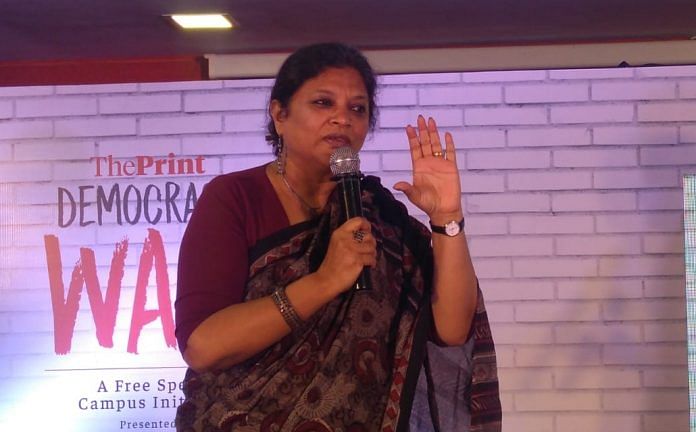From Rahul Gandhi and #MeToo to Hindutva and the need for community radio stations, the seventh edition of Democracy Wall at K.C. College had it all.
From what being liberal really means to the need for a #MeToo movement in the country, last week’s Democracy Wall at K.C. College Mumbai saw a wide range of issues being debated by some very vocal and inquisitive students.
The seventh edition of Democracy Wall at the Colaba campus featured prominent speakers like Mumbai Congress President Sanjay Nirupam, actor Divya Dutta, activist and filmmaker Archana Kapoor, rapper Kekho Thiamkho and comedian Abijit Ganguly.
Nirupam’s session was especially charged. Students grilled the politician on the Congress’ performance while it was in the government, the party’s stand on Hindutva and Rahul Gandhi’s recent tweet where he shared a video of two Dalit children being assaulted, for which he got a notice from the Maharashtra child rights body for “disclosing their identity”.
The former MP answered each question the students asked, unfazed.
“He was not wrong in doing so. He was condemning the act,” Nirupam said. He added, ideally the students should question why the government did not condemn the act and immediately act against perpetrators.
The highlight of the heated debate was college principal Hemlata Bagla, taking the microphone to categorically state that her students are free-thinking adults and don’t get swayed by narratives.
Before the event began, she also told the students, “If there is a question in your mind, it should be on your lips.” This is an important step as it encourages an environment of fearless free speech within campuses at a time when several institutions are trying to be politically correct.
Nirupam also clarified that the Congress was not against Hindutva. “We are Hindus too and we are very religious. Hindu is a very tolerant religion. Practising Hindutva is fine. But one should not become a fanatic. Under the BJP, it is a fanatical strain of Hindutva that is being promoted (sic),” Nirupam said.
This edition of Democracy Wall also had a rare moment of a politician owning up to a mistake. A student asked the Mumbai Congress chief regarding his comment on Karnataka Governor Vajubhai Vala after the state election results. Nirupam courted controversy after he called the governor a “loyal dog”.
Responding to the student, Nirupam said he regretted his choice of words. He justified his reasons by elaborating on how it was a conflict of interest for Vala to decide on who to invite to form the Karnataka government because he had been a minister in Narendra Modi’s Gujarat government. “But, I should not have used that word,” Nirupam said.
Comedian Abhijit Ganguly lightened the atmosphere after Nirupam’s high-voltage session with a laugh riot. His digs on politics, marriage and being middle class had the audience in splits.
Students also discussed the merits of having community radio stations to empower and give a voice to small microcosms with Archana Kapoor, founder of Radio Mewat, a community radio station in a small region of Haryana. While everyone spoke about the broader benefits of giving a mass communication tool to individuals within small communities, a student raised concerns on whether this could also be used to advocate violence and discrimination if left unregulated.
Kapoor said self-regulation was an integral part of the system. “The community is guided by an unwritten code of ethics,” she added.
Actor Divya Dutta, who won her first National Award for her performance in the film Irada this year, spoke to students about the need to continue doing what one believes in, with patience and without setting a deadline for the dream to come true. She shared her story of how she was about to pack her bags and leave Mumbai before she got a role in Train to Pakistan.
Dutta spoke freely on a number of issues such as sexual harassment within the film industry and the latest buzzword in Bollywood, “nepotism”.
Dutta said, like the #MeToo campaign, names will come out of Bollywood too but it will take a few years. She added, “Yes we are not naming people because it doesn’t take you anywhere. You have to be aware, you need to learn how to say no,” she said.
Rapper Kekho, who travelled out of the northeast for the first time to attend Democracy Wall in Mumbai, beautifully showed how freedom of speech is not just restricted to spoken words but applies to music and art too.
His song “I am an Indian” was a hit among students for its unique take on racism and discrimination against people from India’s northeastern states.






